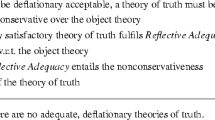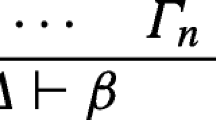Abstract
I here argue for a particular formulation of truth-deflationism, namely, the propositionally quantified formula, (Q) “For all p, \({\langle \text{p}\rangle}\) is true iff p”. The main argument consists of an enumeration of the other (five) possible formulations and criticisms thereof. Notably, Horwich’s Minimal Theory is found objectionable in that it cannot be accepted by finite beings. Other formulations err in not providing non-questionbegging, sufficiently direct derivations of the T-schema instances. I end by defending (Q) against various objections. In particular, I argue that certain circularity charges rest on mistaken assumptions about logic that lead to Carroll’s regress. I show how the propositional quantifier can be seen as on a par with first-order quantifiers and so equally acceptable to use. While the proposed parallelism between these quantifiers is controversial in general, deflationists have special reasons to affirm it. I further argue that the main three types of approach the truth-paradoxes are open to an adherent of (Q), and that the derivation of general facts about truth can be explained on its basis.
Similar content being viewed by others
References
Armour-Garb B. (2010) Horwichian minimalism and the generalization problem. Analysis 70: 693–703
Asher N. (1987) A typology of attitude verbs and their anaphoric properties. Linguistics and Philosophy 10: 127–189
Bach K. (1997) Do belief reports report beliefs?. Pacific Philosophical Quarterly 78: 215–241
Baldwin T. (1989) Can there be a substantive theory of truth?. Recherche sur la Philosophie et le Langage 10: 99–118
Båve, A. (2006). Deflationism: A use-theoretic analysis of the truth-predicate, Acta Universitatis Stockholmiensis, doctoral dissertation, Stockholm: Almqvist & Wiksell.
Båve A. (2009) Deflationism and the primary truth-bearer. Synthèse 173: 281–297
Blackburn S. (1984) Spreading the word. Clarendon Press, Oxford
Carroll L. (1895) What the tortoise Said to Achilles. Mind 4: 278–280
Chapuis, A., Gupta, A. (eds) (2000) Circularity, definition and truth. Indian Council of Philosophical Research, New Delhi
Chisholm R. (1977) Theory of knowledge (2nd ed.). Prentice-Hall, Englewood Cliffs
David M. (1994) Correspondence and disquotation. Oxford University Press, Oxford
Dodd J. (2000) An identity theory of truth. St. Martin’s Press, New York
Eklund M. (2002) Inconsistent languages. Philosophy and Phenomenological Research 64: 251–275
Field H. (1984) Is mathematical knowledge just logical knowledge?. The Philosophical Review 93: 509–552
Field H. (1994) Deflationist views about meaning and content. Mind 103: 249–285
Field H. (2006) Compositional principles versus schematic reasoning. The Monist 89: 9–27
Forbes, G. (1986). Truth, correspondence and redundancy. In G. MacDonald & C. Wright (Eds.), Fact, science and morality (pp. 27–54). Oxford: Basil Blackwell.
Gupta A. (1993) Minimalism. Philosophical Perspectives: Language and Logic 7: 359–369
Gupta A. (1993) A critique of deflationism. Philosophical Topics 21: 57–81
Haack S. (1978) Philosophy of logics. Cambridge University Press, Cambridge
Heidelberger H. (1968) The indispensability of truth. American Philosophical Quarterly 5: 212–217
Hill C. (2002) Thought and world: An Austere portrayal of truth, reference, and semantic correspondence. Cambridge University Press, Cambridge
Horwich P. (1998) Truth (2nd ed.). Clarendon Press, Oxford
Horwich P. (2010) Truth-Meaning-Reality. Oxford University Press, Oxford
Hugly P., Sayward C. (1996) Intensionality and truth. Reidel, Dordrecht
Kalderon M. E. (1997) The transparency of truth. Mind 106: 475–498
King J. (2002) Designating propositions. Philosophical Review 111: 341–371
Kirkham R. (1992) Theories of truth. MIT Press, Cambridge, MA
Kneale W. (1972) Propositions and truth in natural languages. Mind 81: 225–243
Kovach A. (1997) Deflationism and the derivation game. Mind 106: 575–579
Kripke, S. (1976). Is there a problem about substitutional quantification? In G. Evans & J. McDowell (Eds.), Truth and meaning (pp. 325–419). Oxford: Clarendon Press.
Künne W. (2003) Conceptions of truth. Oxford University Press, Oxford
MacDonald, G., Wright, C. (eds) (1986) Fact, science and morality. Basil Blackwell, Oxford
Mackie J. L. (1973) Truth, probability, and paradox. Oxford University Press, Oxford
McGee V. (1985) A counterexample to Modus Ponens. Journal of Philosophy 82: 462–471
McGee, V. (2000). The analysis of ‘x is true’ as ‘For any p, if x=“p”, then p’, In A. Chapuis & A. Gupta (Eds.), Circularity, definition and truth. New Delhi: Indian Council of Philosophical Research.
McGrath M. (1997) Weak Deflationism. Mind 106: 69–98
McGrath M. (1997) Reply to Kovach. Mind 106: 581–586
Moltmann F. (2003) Propositional attitudes without propositions. Synthese 135: 77–118
Pap A. (1952) Note on the ‘Semantic’ and ‘Absolute’ concept of truth. Philosophical Studies 3: 1–8
Platts M. (1979) Ways of meaning. Routledge and Kegan Paul, London
Prawitz D. (1965) Natural deduction: A proof-theoretical study. Almqvist & Wiksell, Stockholm
Prior A. N. (1971) Objects of thought. Clarendon Press, Oxford
Raatikainen P. (2005) Horwich’s way out. Analysis 65: 175–177
Ramsey F. (1927) Facts and propositions. Proceedings of the Aristotelian Society 7(supp.): 153–170
Ramsey, F. (1928/1991). On truth. In N. Rescher & U. Majer (Eds.). Dordrecht: Kluwer.
Resnik, M. D. (1990). Immanent Truth. Mind 99, 405–424.
Schiffer S. (2006) Propositional content. In: Lepore E., Smith B. (eds) Oxford handbook of philosophy of language. Oxford University press, Oxford, pp 267–294
Soames S. (1999) Understanding truth. Oxford University Press, Oxford
Soames, S. (2003). Understanding deflationism. Philosophical Perspectives, Language and Philosophical Linguistics, 17, 369–383.
Sosa E. (1993) The truth of modest realism. Philosophical Issues. Science and Knowledge 3: 77–95
Strawson P. F. (1974) Positions for quantifiers. In: Munitz M. K., Unger P. (eds) Semantics and philosophy. New York University Press, New York, pp 63–79
Tarski, A. (1935/1983). The concept of truth in formalized languages. Indianapolis: Hackett. (Translated and reprinted in A. Tarski, Logic, Semantics, Metamathematics.
Tarski A. (1944) The semantic conception of truth. Philosophy and Phenomenological Research 4: 341–376
van Inwagen, P. (2002). Generalizations of homophonic truth-sentences. In R. Schantz (Ed.), What is truth? (pp. 205–222). Berlin: de Gruyterpp.
Williams C. J. F. (1976) What is truth?. Cambridge University press, Cambridge
Williamson T. (1999) Truthmakers and the converse Barcan formula. Dialectica 53: 253–270
Williamson T. (2007) The philosophy of philosophy. Blackwell, Oxford
Author information
Authors and Affiliations
Corresponding author
Rights and permissions
About this article
Cite this article
Båve, A. Formulating deflationism. Synthese 190, 3287–3305 (2013). https://doi.org/10.1007/s11229-012-0163-2
Received:
Accepted:
Published:
Issue Date:
DOI: https://doi.org/10.1007/s11229-012-0163-2




